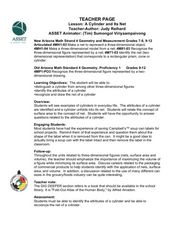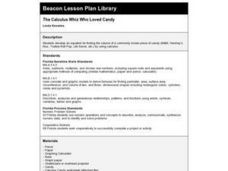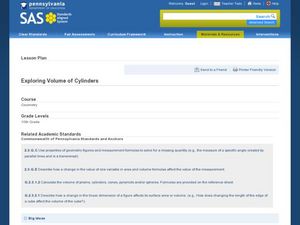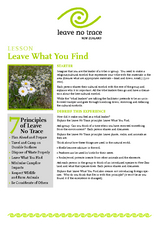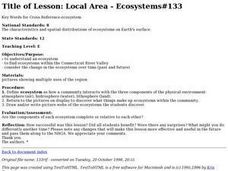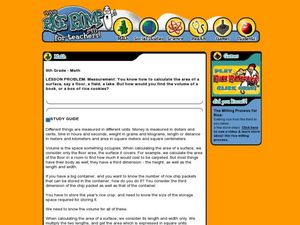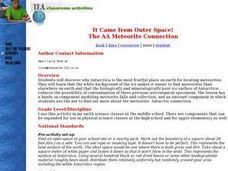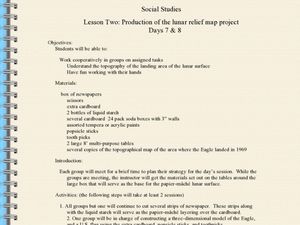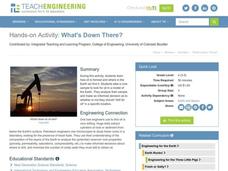Curated OER
A Cylinder and Its Net
Students sketch the nets for given polygons and cylinders. In this geometry lesson, students find the measurements that correspond with prisms, cones and cylinders. they identify parts of three-dimensional shapes.
Curated OER
Perimeter
Pupils explore the concept of perimeter. In this perimeter lesson, students discuss how to find perimeter of various shapes. Pupils use the Perimeter Explorer applet to find the perimeter of various shapes.
Curated OER
The Circle's Measure
Young scholars explore circumference and diameter. In this math lesson, students apply their knowledge of circumference and diameter to solve mathematical riddles. Young scholars apply this knowledge to find circumference and diameter of...
Curated OER
Pyramids- Slant Height and Altitude
Students calculate the height and altitude of a pyramid. In this geometry lesson, students define the parts that make up a pyramid. They use the Pythagorean Theorem to find the missing parts of a pyramid.
Curated OER
The Calculus Whiz Who Loved Candy
Students develop an equation for finding the volume of a commonly known piece of candy (M&M, Hershey's Kiss, Tootsie Roll Pop, Life Saver, etc.) by using calculus.
Curated OER
Ara of Circles
Students identify the differentiate the different properties of circles and parallelograms. In this geometry lesson, students calculate the area of each solid and identify the formula. They relate Pi to the circumference of a circle.
Curated OER
HOW FAST DO SEDIMENT GRAINS OF DIFFERENT SIZES SETTLE?
Students conduct an experiment using sand, a jar, and a paper clip to analyze the effects of different kinds of sand vis a vis its sediment. They graph their findings and analyze for factors of size, shape, and density.
Curated OER
Similar Triangles
Ninth graders find the height of every day objects using techniques learned through postulates that allow triangles in a problem to be similar. They calculate the length of a missing side and solve proportions.
Curated OER
Exploring Volume of Cylinders
Tenth graders investigate the volume of a cylinder. In this geometry lesson plan, 10th graders create three-dimensional cylinders and use a ruler to determine the dimensions. The lesson plan progresses to the use of the...
Curated OER
Design a Better Classroom Workplace
Students design a new classroom workplace. In this architecture lesson, students use area formulas to identify the problem with the existing desks in their classroom. Students design their own solution volume formulas to solve the...
Curated OER
Practice Quiz -Equilibrium
In this equilibrium learning exercise, students solve eight problems including determining the effects of changes to a system as it related to Le Chatelier Principle, calculating equilibrium constants and finding boiling points of...
Curated OER
Leave What You Find
Students explore environmental awareness by participating in a role play activity. In this cultural analysis lesson plan, students discuss the importance of symbolism when referring to a tribe and create their own tribe based on a small...
Curated OER
Local Area - Ecosystems
Students examine ecosystems in the Connecticut River Valley. They view and discuss photos of ecosystems within their community, and create a picture web of an ecosystem.
Curated OER
Measurement: Volume
Sixth graders determine how to find the volume of a box. For this volume lesson, 6th graders participate in a lesson in which the teacher uses the associated study guide to explain how to find the volume of a cubic figure. They use boxes...
Curated OER
Mars Geologic Mapping
Students identify and interpret photographic details of a Martian surface image, design, and create a simple features map. They identify and interpret the geologic history of a part of Mars' surface and then, analyze and discuss the...
Curated OER
Earthquake Waves And Their Destructions
Students investigate primary and secondary waves and how to measure the magnitude of waves. They discover how to find the epicenter of earthquakes. They examine why waves are more destructive in some areas than others through these...
Curated OER
It Came from Outer Space! The AA Meteorite Connection
Students discover why Antarctica is the most fruitful place on earth for locating meteorites. They work in groups. Students are given a Museum or University Name for each group. They are explained that each group is allowed to comb...
Curated OER
Production of the Lunar Relief Map Project
Students replicate the lunar surface. In this mapping skills lesson, students study the topography of the moon. Students then use craft materials to create topographic maps of the lunar surface where the Eagle landed.
Curated OER
What's down there?
young scholars analyze how oil is formed and where in the Earth we find it. Students take a core sample to look for oil in a model of the Earth. They analyze their sample and make an informed decision as to whether or not they should...
Curated OER
Geological Forces and Topography
Students discuss and research the Earth's geological processes. For this geology lesson, students study maps of Utah and the United States to learn about geological features. Students then complete the research cards for each area of...
Curated OER
Discovering Friction
Students watch a demonstration that introduces them to the idea that friction is a force that impedes motion when two surfaces are in contact. They work in groups to experiment with frictional force using a coffee cup on which they alter...
Curated OER
Remote Sensing
Ninth graders participate in a variety of activities designed to reinforce the concept of light and the electromagnetic spectrum. They research and analyze data from remotely sensed images. They present their findings in a PowerPoint...
Curated OER
Cultures of the Ring of Fire
Students explore the Ring of Fire. In this Ring of Fire lesson, students research information about the Ring of Fire and plate tectonics. Students write 2-page research papers regarding their findings.
Curated OER
Earthquake Epicenters and Magnitudes
Pupils work on a virtual earthquake to increase their understanding of seismograms, earthquake epicenters, Richter Magnitude and triangulation when finding the epicenter of an earthquake.
